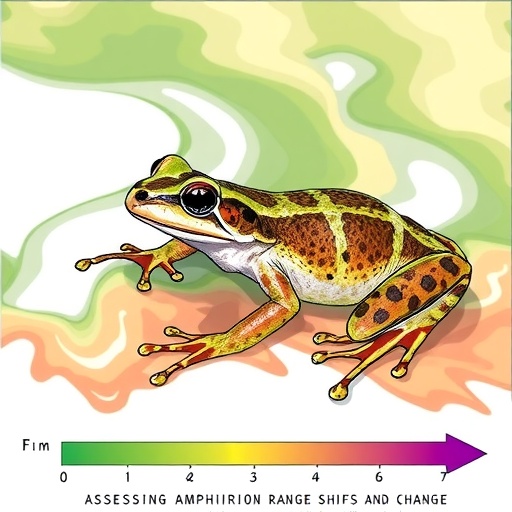
In the fascinating world of amphibians, the treefrog has emerged as a remarkable model for studying parental investment, particularly paternal care. Recent research by Cheng, Xie, and Chen delves deep into a phenomenon known as paternal care plasticity, where male treefrogs exhibit differing levels of care based on the developmental stage of their embryos. This groundbreaking study reveals that male treefrogs show a notable preference for caring more for early-developing embryos compared to those that are late in their developmental stages.
The complex realm of parental care among treefrogs is a rich area of investigation, especially when considering the evolutionary implications of such behaviors. Parental investment strategies can significantly influence reproductive success, ultimately shaping the evolutionary trajectory of a species. The findings from this study shed light on how environmental cues and the developmental needs of embryos can drive male parental behavior, impacting not just individual offspring but also potentially influencing broader population dynamics.
Paternal care plasticity refers to the flexibility of caregivers in their approach to offspring care, adapting their behaviors based on various factors. In the case of treefrogs, this plasticity seems to hinge on the developmental timing of the embryos. Early-developing embryos require more immediate and intensive care, while later stages may be more resilient, allowing males to adjust their investment according to the various needs of their offspring at different developmental phases.
In the intricate breeding rituals of treefrogs, males often engage in elaborate vocal displays and physical contests to attract females. After mating, the role of the male doesn’t end; it transitions into one of caregiver. What is particularly fascinating is the distinction made by treefrog males in their caregiving strategies. By channeling more resources and attention toward early-developing embryos, these males demonstrate an evolutionary adaptation that could maximize their reproductive success.
This study’s findings underscore the essence of paternal care in treefrogs, where every decision made by the male can influence the survival of the next generation. Early-developing embryos may require more protection from environmental stresses and predators, thus necessitating a greater investment of time and resources by the male. In contrast, late-developing embryos, already more developed and resilient, may not demand the same level of care, prompting the male to allocate resources more effectively.
The research conducted by Cheng and colleagues employed a combination of observational studies and controlled experiments to assess male behavior toward embryos at varying developmental stages. Their methodology was meticulous, focusing on different environmental conditions and the specific interactions between males and their embryos. Such detailed analysis provides a deeper understanding of the adaptive significance of paternal care and its potential evolutionary advantages for male treefrogs.
The evolutionary implications of these findings extend beyond individual behavior. By adapting care strategies according to the developmental needs of their offspring, male treefrogs may contribute to enhanced survival rates within their populations. This could have significant implications for the long-term viability of species in fluctuating environments, where versatility in parenting could be a crucial determinant of survival.
Additionally, this research opens pathways for further investigations into the mechanisms underlying such behaviors. Understanding the hormonal and neurobiological pathways involved in paternal care plasticity could provide insights into the evolutionary pressures that have shaped these behaviors over time. This study poses questions about how other species, not just treefrogs, might display similar adaptive behaviors and the role of environmental factors in influencing parental investment strategies.
Moreover, the concept of plasticity itself in paternal care invites comparisons with other taxa. Are there parallels in bird species, where male care varies depending on the developmental state of chicks? The quest for knowledge in comparative behavioral ecology is driven by such inquiries, aiming to bridge the gap between different forms of animal life and their parental strategies.
As research on paternal care continues to evolve, the implications stretch into conservation efforts. Understanding the subtleties of how environmental stressors impact parental behaviors in amphibians may inform strategies in habitat management and species protection. It also brings into focus the critical importance of maintaining biodiversity and ecological balance, as losing one species can disrupt the delicate dynamics of parental care that sustain various ecosystems.
In summary, the study by Cheng, Xie, and Chen presents a compelling narrative on paternal care plasticity in male treefrogs. This research not only brings to light the complexities of reproductive strategies but also emphasizes the ever-intriguing interplay between behavior, evolution, and the environment. As we unravel these layers of natural history, we gain a deeper appreciation for the intricate lives of amphibians and, by extension, all creatures that share our planet.
As this field of research advances, we anticipate that future studies will continue to illuminate the detailed mechanisms driving parental behaviors, enhancing our overall understanding of animal ecology and the evolutionary pressures that shape life on Earth. This knowledge is vital, not only for the academic realm but for all of us who are keenly interested in the richness of life that surrounds us.
Subject of Research: Paternal Care Plasticity in Treefrogs
Article Title: Paternal care plasticity: males care more for early- than late-developing embryos in an arboreal breeding treefrog.
Article References:
Cheng, YC., Xie, CH., Chen, YC. et al. Paternal care plasticity: males care more for early- than late-developing embryos in an arboreal breeding treefrog.
Front Zool 21, 16 (2024). https://doi.org/10.1186/s12983-024-00537-z
Image Credits: AI Generated
DOI: 10.1186/s12983-024-00537-z
Keywords: Paternal care, treefrogs, behavioral ecology, parental investment, evolutionary biology.
Tags: amphibian reproductive successearly-stage embryo careenvironmental cues in parental behaviorevolutionary implications of paternal caremale caregiving behaviors in treefrogsmale treefrogsoffspring developmental needsparental care research in amphibiansparental investment strategiespaternal care plasticitypopulation dynamics in amphibianstreefrog parental care behaviors




